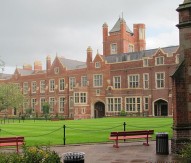
Profile: 20 years of ageing research at Newcastle University
The Newcastle University Institute for Ageing has grown well beyond its biomedical roots, and now incorporates the work of over 700 people from across the University and an annual research programme of nearly €30m. Its broad research portfolio addresses various questions.
How do we age?
- Why do our bodies experience the features of ageing?;
- What changes occur at a molecular and cellular level?; and
- Why are we more likely to develop illnesses as we grow older?
How can we age better?
Building on understanding of the causes of the full range of conditions relevant to later life, and of the epidemiology of ageing, to explore:
- New interventions for chronic disease, including new medicines and exercise;
- The need for treatment, care and support, and improvements to care provision;
- How exercise, diet, attitude and involvement contribute to healthy ageing through life, and how to support and encourage helpful behaviours; and
- How inequality of opportunity creates and embeds inequality of health.
How can we address the global challenge of ageing?
Working with partners to explore how our environment can contribute to ageing well:
- Can the space in which we live or work, through its design, enable us to remain healthy for longer or better support us as our capability is reduced with age?;
- Should we design differently, recognising the wider range of capabilities present in an ageing society?;
- Can we envisage, design and implement technologies that support individuals to adopt and maintain the behaviours through which they age well, or that better compensate for individual loss of capacity or capability?;
- How do we persuade people to use these tools when they are available?;
- How can we support people to remain active in the workforce or as consumers?;
- How do we address the growing market of older people, what will they buy?; and
- What do we need to do to prepare ourselves for retirement?
But excellence in research is not enough. Ageing is a huge driver for change, and where there is change there is opportunity for innovation. By substantially changing the way we think about ageing and older people, we can create a world better suited to the much older population balance we will see in future. For much of the past ten years, Newcastle has been working hard to ensure that its global excellence in ageing research is translated into societal change and innovation. This has been at the heart of the development of the institute’s headquarters on Newcastle’s Campus for Ageing and Vitality as an innovation centre, bringing together academia, healthcare, business and the public to develop products, services and other solutions better suited to an ageing society. Its VOICENorth public participation mechanism provides thousands of opportunities for the public to understand and shape research and innovation and the design of new products and services. Through its Changing Age for Business programme, supported by the European Regional Development Fund from 2009-2012, it has worked with hundreds of SMEs and entrepreneurs. Many have gone on to produce new products and services, and the jobs and economic growth resulting from them.
As Newcastle University celebrates the 20th anniversary of the formation of its multidisciplinary research institute in ageing, it has plenty to get excited about. December 2014 brought two announcements which will strengthen Newcastle University’s ability to contribute to ageing-related innovation.
The UK Government has announced approximately €25m, matched from other sources, to support the development of a national centre for ageing science and innovation on the Campus for Ageing and Vitality. This will take capital investment in the campus to over €80m, including laboratories, clinical research and imaging facilities, innovative clinics and business innovation facilities, as well as the headquarters of the National Institute for Health Research’s Newcastle Biomedical Research Centre in Ageing and Chronic Disease. The new centre will greatly increase capacity to work with partners, supporting businesses and entrepreneurs to meet both the challenges and the opportunities of global demographic ageing.
The award by the European Institute for Innovation and Technology of its EIT Health KIC to a consortium in which Newcastle University, along with leading businesses and academic institutions from throughout Europe, is a core partner ensures that this centre’s reach will extend into Europe. Newcastle University has been strongly represented in previous EU funding programmes and looks to strengthen its participation in ageing during the course of Horizon 2020. EIT Health will provide the high powered partnerships and support funding necessary to make a real difference to the European innovation environment in lifelong health and active ageing.

Graham V R Armitage MBE
Deputy Director
Newcastle University Institute for Ageing
Newcastle University
Campus for Ageing and Vitality
Newcastle-upon-Tyne
NE4 5PL
United Kingdom
+44 (0) 191 2481306




